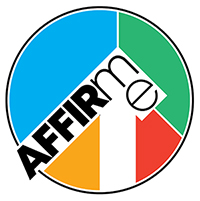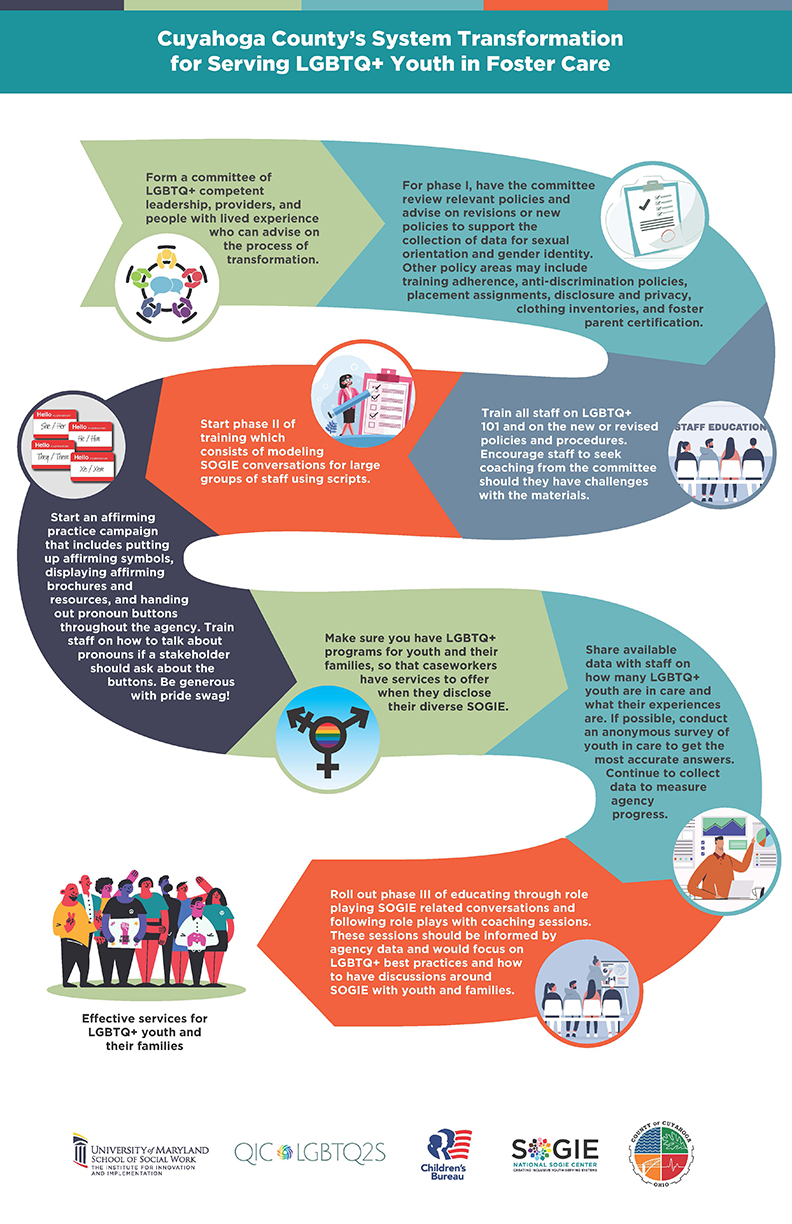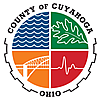AffirmMe - County Program to Service LGBTQ Community Receives National Recognition
 The culmination of a four- year federal grant project has not only changed the ways Cuyahoga County Division of Children and Family Services address the needs of youth who identify as LGBTQ+ but has also provided a blueprint for Health and Human Services divisions throughout the nation to follow.
The culmination of a four- year federal grant project has not only changed the ways Cuyahoga County Division of Children and Family Services address the needs of youth who identify as LGBTQ+ but has also provided a blueprint for Health and Human Services divisions throughout the nation to follow.
Through a collaboration between DCFS, Case Western Reserve University, A Place for Me, and Kinnect, an Ohio-based non- profit that works to improve the child welfare system, the Affirm.Me program was created and continues to service youth with diverse orientations.
The AFFIRM.ME program is a set of services developed to improve the lives of LGBTQ2S –lesbian, gay, bisexual, transgender, questioning, and two-spirit --youth in foster care.
Jennifer Croessmann, M.S.S.A., L.I.S.W., a special project coordinator for Cuyahoga County Health and Human Services (HHS) who worked on the grant and implementation of the AFFIRM.ME project, said the idea for the program came about as a way for the Agency to be intentional about its service towards LGBTQ youth.
In 2017, Cuyahoga County and its partners, applied and received a grant from the National Quality Improvement Center (QIC) on Tailored Services, Placement Stability, and Permanency for Lesbian, Gay, Bisexual, Transgender, Questioning, and Two-Spirit Children and Youth in Foster Care.
“We recognized that we didn’t know who our LGBTQ+ youth were, therefore, we were not able to accomplish our mission to make sure they were safe,” said Croessmann during a podcast interview about the program. “We further recognized there was a disconnect among staff, service providers, young people, and families as to why it is important to know a youth identifies as LGBTQ+. We wanted to develop practices that inform everyone that understanding a youth’s SOGIE (and we all have one) is critical to determining their safety, stability, and service needs.”
According to Croessmann, the Affirm.Me program goals are to identify youth with diverse sexual orientation and gender identity within the foster care and adoptive system, provide training for DCFS staff to support their clients and to work with biological families to provide supportive services to repair family relationships or place youth with affirming caregivers, if necessary.
To identify youth in Cuyahoga County who are LGBTQ, a confidential phone survey system based on the LA RISE Survey was implemented as part of the grant.
Getting the Numbers
In 2014, a study by the Williams Institute concluded that one in five foster care youth in LA County identify as LGBTQ. Moreover, the study indicated that these youth often experience stress and have conflicts with family members and others due to their orientation.
In 2019 Cuyahoga County replicated the LA County study, through the National Quality Improvement Center, conducted a phone and text survey with Foster Youth within the DCFS system. Cuyahoga County was the first midwestern child welfare agency to conduct such a survey. This survey and resulting research analysis is known as the Cuyahoga Youth Count (CYC).
When the survey was concluded, 32 percent of Cuyahoga County youth in foster care identified as LGBTQ+.
“We kept getting emails from universities and organizations from all over the country about the CYC results,” said Croessmann who added that many couldn’t or refused to believe that a midwestern county would have more LGBTQ+ youth identify than Los Angeles County.
With that information, the Affirm.Me team began to create best practices to educate and train staff on how to best service the population, including developing a survey to ask youth in foster care.

Training Staff
Through small groups, workshops, virtual trainings, and conferences, DCFS staff working with foster care youth received trainings on SOGIE and how to identify and service LGBTQ+ youth. Many of the trainings focused on how to broach the subject of orientation and identity without making the child feel defensive.
For staff to place a child with a family that affirms their orientation, staff will have to know about their orientation.
“Staff have to do it, ask questions, to get comfortable,” said Croessmann who added that staff would oftentimes team up in groups of two asking each other the survey questions.
As DCFS staff have become better acclimated to service diverse populations, efforts are being made to educate families and provide reunification support when possible.
Currently, DCFS staff have identified about 14 percent of youth involved in child welfare Cuyahoga County who identify as LGBTQ+. Before the grant, staff identified only 3% of our youth in foster care as LGBTQ+. This is a 367% increase and a tremendous start!
There is still a gap of approximately 18% of youth, based on the CYC, who have not been identified through our safe identification practice. Croessmann attributes the gap to a myriad of reasons, including staff and youth discomfort.
Many staff aren’t asking, and no matter how we ask, a young person may not feel comfortable disclosing to a DCFS caseworker for several reasons. The most important thing we can is to introduce ourselves with our pronouns, talk to young people alone to ask about their pronouns, and ask disarming questions about sexual orientation. These questions plant a seed to show we care about them and whether their safety is being impacted by adults and others rejecting them for who they are. That rejection may lead to abuse and/or neglect.
Staff must explain that we are asking to help determine if they are safe at home or in foster care, and because if they need medical, mental health care, or just a group to connect with other youth we want to make sure these services affirm and celebrate them for who they are. Young people may still not feel comfortable, but again, it sets the stage for them to understand that we care about their safety and well-being. This may help them to process their feelings and disclose to another adult when they are ready.
“We still have more work to do,” Croessmann added.
National Recognition
Members of the DCFS recently went to Bethesda, MD to participate in the conference with the National SOGIE Center. At that conference, the Cuyahoga County model was shared with child welfare and social service professionals throughout the country. Cuyahoga County is also featured prominently on the https://www.sogiecenter.org/ website.
While the grant period has ended, Cuyahoga County and its partners will continue the work of ensuring the dignity of diverse orientation foster care youth.
For more information about the Affirm.Me program, visit the Cuyahoga County Health and Human Services website.

